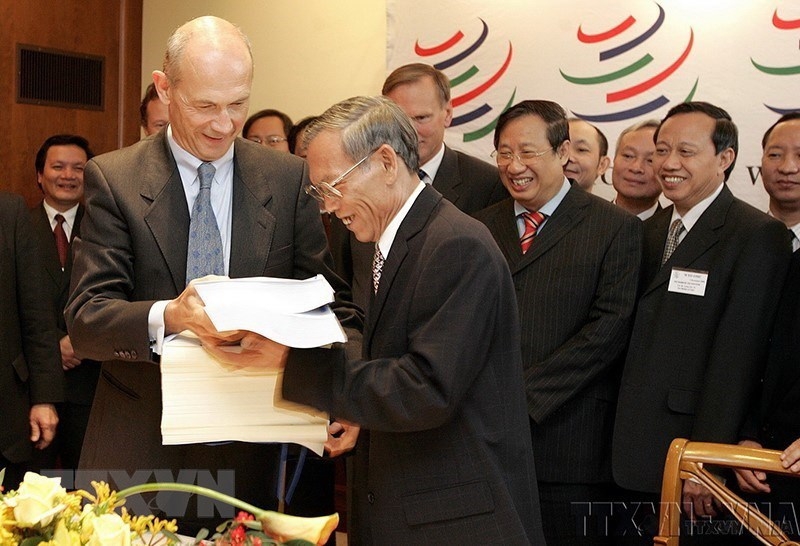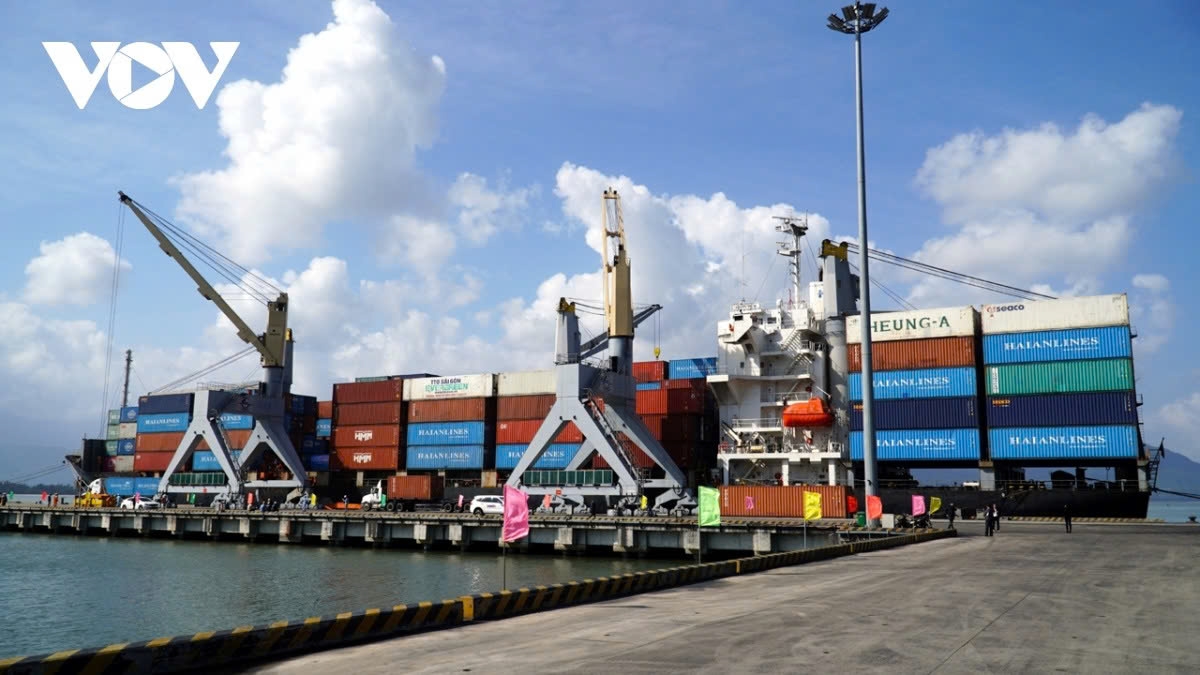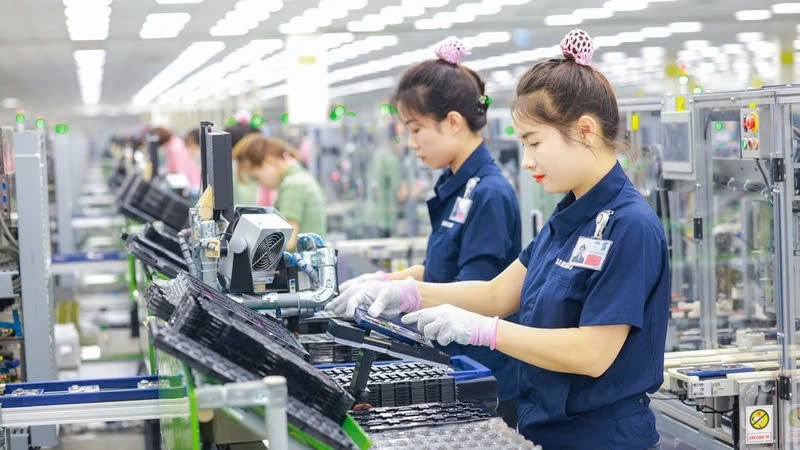WTO membership bears fruit for Vietnam after 18 years of admission
Society – Economy - Ngày đăng : 12:43, 07/11/2024
Economic and legal institution reforms

On November 7, 2006, the country’s accession to the WTO was formalised with the signing of the Protocol of Accession by Vietnamese Minister of Trade Truong Dinh Tuyen and WTO Director-General Pascal Lamy, at the WTO headquarters in Geneva, Switzerland. The WTO membership has allowed the country to fully integrate into the global trading system, setting the stage for its subsequent economic growth and the signing of numerous bilateral and multilateral free trade agreements.
Joining the WTO profoundly impacted Vietnamese policy thinking, governmental management standards, corporate governance, and its legal and regulatory framework. It helped to shape the country’s economic and trade institutions, thereby creating a solid legal foundation which in turn allowed Vietnam to open up its markets and expand its trade in goods and services. It also improved its overall international trade efficiency in line with both multilateral and bilateral agreements.
These reforms have significantly boosted the transparency of economic management, improved the business environment, and elevated the country’s position on the international stage.
According to the World Economic Forum (WEF), between 2007 and 2017, Vietnam’s Global Competitiveness Index (GCI) improved by 13 places, moving from the lower half of the global competitiveness ranking to the upper half. In 2019, the country’s GCI ranking rose by 10 spots compared to 2018, placing it at 67th out of 141 economies. Although the WEF did not publish new rankings post-2019 due to the COVID-19 pandemic, the previous rankings indicate significant progress made for the country.
To date, Vietnam has since established diplomatic ties with more than 190 countries and territories and developed economic relations with more than 230 countries and territories worldwide. Most notably, the WTO’s more than 500 bilateral and multilateral agreements, including 17 free trade agreements (FTAs) Vietnam has joined have provided it with the tools to further refine its market economy, confidently integrate into the global economy, and further expand its trade partnerships.
Sound trade performance

The WTO accession has left a profound mark on Vietnam’s economic development, particularly in trade openness. With an open economy ratio of 200% of GDP, the country has successfully transitioned from a trade deficit to a trade surplus for eight consecutive years, starting from 2016.
Statistics show the country’s total trade turnover skyrocketed from US$84.7 billion in 2006 to US$681 billion in 2023, marking an eightfold increase over 17 years. Since 2016, the country has consistently maintained a positive trade balance, rising from just US$1.77 billion in 2016 to US$28.3 billion in 2023.
The WTO’s 2020 trade report noted that Vietnamese trade growth has been the most significant among the world’s top 50 merchandise trading economies, moving from 39th place in 2009 to 23rd in 2019, before rising into the top 20 by 2021.
The Vietnamese export structure has experienced a significant shift since its accession to the WTO. The country has moved away from a heavy reliance on agricultural products and seafood, transitioning towards industrial goods, processed products, and high-tech items. In 2023, exports from the processing and manufacturing sectors duly accounted for 85% of total export turnover.
Its WTO membership has not only contributed to boosting trade growth, but also expanded economic cooperation and diversified its export markets. So far Vietnam has signed and implemented a total of 17 free trade agreements and is negotiating two other agreements. Among these are the EU-Vietnam Free Trade Agreement (EVFTA) and the Comprehensive and Progressive Agreement for Trans-Pacific Partnership (CPTPP), both of which have allowed the country to gain deeper access to large markets whilst strengthening the competitiveness of its exports.
In 2023, two-way trade turnover between Vietnam and the EU hit US$72.3 billion, making the country the EU’s largest trade partner in ASEAN.
Furthermore, Vietnamese trade relationships with several major global economies such as the United States, Japan, the Republic of Korea, and China also witnessed significant progress, all of which has helped to elevate Vietnam to be a key trade partner within the Asia-Pacific region.
A leading destination for FDI worldwide

Alongside its participation in FTAs, Vietnam has consistently attracted a significant amount of foreign direct investment (FDI) over the years. In 2020, it was ranked 19th among the top 20 countries globally in terms of FDI attraction, improving by five spots compared to 2019, according to UNCTAD. By 2023, registered FDI in Vietnam had reached US$36.6 billion, making the country one of the leading destinations for FDI worldwide.
This growth is a testament to Vietnam’s continuous efforts to integrate into the global economy, making it an attractive investment hub whilst reinforcing its strategic position in the Asia-Pacific region. Indeed, the country has become a key production hub for major high-tech companies such as Samsung, Intel, LG, and Foxconn. These companies have set up manufacturing factories, significantly driving the growth of the country’s supporting industries and technological innovation.
The influx of FDI has not only boosted the Vietnamese manufacturing sector, but has also led to long-term benefits, such as improving domestic companies’ production capacity and management skills. These improvements have contributed to positioning Vietnam as an increasingly important link in global value chains.
The results of Vietnamese trade and economic reforms since joining the WTO demonstrate the country’s open approach to international trade and its commitment to fulfilling its WTO obligations. These achievements can be considered the outcome of persistent and coordinated efforts to implement a series of comprehensive reforms, including restructuring the economy, improving growth models, enhancing productivity, and updating legal frameworks.
These changes have therefore fostered a modern, transparent, and competitive business environment, all of which is aligned with international standards as set by the WTO and the new-generation FTAs which the country has signed and continues to negotiate.
Vietnam’s integration into the global economy and the liberalisation of its economy, particularly through economic policy reforms within the framework of the WTO and FTAs, have provided strong momentum for economic development. These efforts have therefore enhanced the country’s soft power, making it a more competitive and modern economy, while simultaneously improving the overall quality of life for its citizens.
